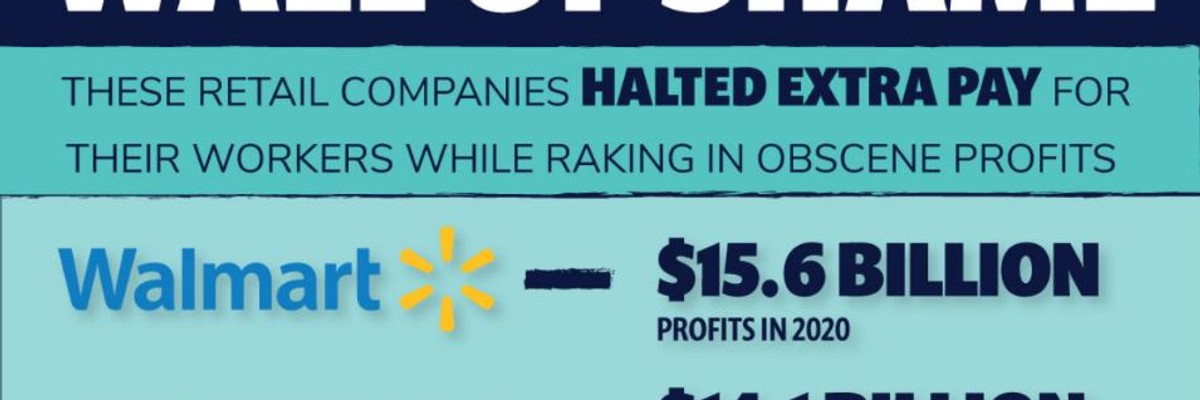Frontline retail workers have been lauded by U.S. corporations as "heroes" this year for keeping operations running during the Covid-19 outbreak, but a new study shows how companies like Dollar General and Walmart--which have made massive profits over recent months--have treated their employees like "sacrificial workers" by stripping hazard pay even as the pandemic soared.
The report, released Thursday by Public Citizen, details how most of the top 15 U.S. retail companies have quietly taken away hazard pay from their frontline workers, even as the coronavirus has continued to spread across the country and is now surging in states including Wisconsin, Nebraska, Wyoming, and Minnesota.
"If 'we're all in this together,' as so many have said during the coronavirus pandemic, why are so many businesses holding out on workers? Why are they prioritizing making executives and shareholders richer over providing a living wage for the workers who risk their health and the health of their loved ones in order to carry out the business' work?"
--Rick Claypool, Public Citizen
Meanwhile, those same companies have benefited from the work of low-wage employees who continue to put themselves at risk. The 15 biggest retailers in the U.S. reported a combined $14.6 billion increase in profits during the 2020 fiscal year, compared with fiscal year 2019. The nine companies which have halted hazard pay and employee bonuses entirely reported $10.5 billion more in profits this year.
"They may say 'we're all in this together,' but too many big retailers are prioritizing maximizing profits over paying their frontline workers," said Rick Claypool, research director at Public Citizen and the author of the report. "While business booms and the pandemic rages, the rich are getting richer--and workers are getting sicker."
The watchdog shared a chart on Twitter showing its "Hall of Shame," a list of five companies--Walmart, Amazon, Kroger, Dollar General, and Albertsons--which have raked in "obscene profits" while slashing extra pay for their workers.
Although hazard pay has vanished for retail workers across the country, reporting to work is no less hazardous than it was when companies announced the bonuses and raises last spring.
A single grocery store in Massachusetts had a 20% infection rate among its workers in May 2020, according to a study published by Occupational and Environmental Medicine, and Amazon reported last month that there have been nearly 20,000 Covid-19 cases among its workers. The United Food and Commercial Workers--the largest union representing grocery store workers--reported that at least 238 members have died of Covid-19 since the pandemic began.
Workers at powerful retail corporations are being treated as "disposable," entrepreneur and fair pay advocate Dan Price tweeted.
"We ask workers with the least to sacrifice the most, and they are not even getting compensated in return," Molly Kinder, a fellow at the Brookings Institution, told the New York Times Thursday. "The companies have the money to do this."
Despite soaring profits thanks to employees who kept stores running, hazard pay ended for many workers almost as soon as it began.
Workers at Dollar General received only one hazard payment, while Kroger ended its bonuses in May after two months. Albertsons, Amazon, and Dollar Tree provided their workers with only three months of hazard pay while Big Lots and Walmart ended their bonuses in July.
Of the 15 largest retailers, only Costco, Publix, Home Depot, and Lowe's continue to provide their workers with extra pay.
Meanwhile, according to the Public Citizen report, companies that have cut hazard pay have shifted their booming resources to stock buybacks. Six of the top 15 companies reported a combined $3.7 billion in buybacks in the last quarter, and seven companies said earlier this year they planned to devote a combined $17.8 billion on stock buybacks.
In the previous quarter, Albertsons, BJ's Wholesale Club, Dollar General, and Walmart spent nearly $3 billion combined on buybacks.
"Any political economy that allows this to go on is fatally flawed," said union organizer Jane McAlevey on social media.
"If 'we're all in this together,' as so many have said during the coronavirus pandemic, why are so many businesses holding out on workers?" wrote Claypool. "Why are they prioritizing making executives and shareholders richer over providing a living wage for the workers who risk their health and the health of their loved ones in order to carry out the business' work?"
"In reality, the pandemic is worsening the systemic inequities--especially economic, racial, and gender inequities--that have long plagued this country," he continued. "The shameful fact of most of these 'essential' household retail corporation's collective cessation of additional pay for workers, even as they plan or actively engage in stock buybacks, shows that it is the corporations who are 'together.' And if they are together 'with' anyone besides one another, it is Wall Street they are with more so than their workers."



